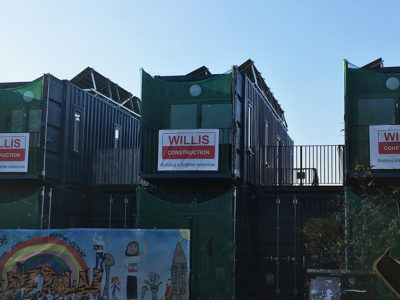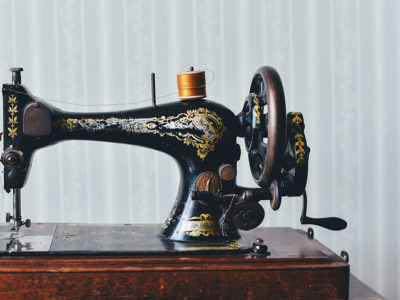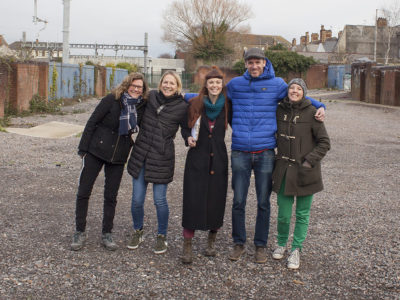Clips from All Our Stories
[youtube width=”400″ height=”200″]http://www.youtube.com/watch?v=Fb8VQ6hGDcM[/youtube]
Suzanne Duval on combating ignorance about minorities
[youtube width=”400″ height=”200″]http://www.youtube.com/watch?v=VehgXfRpXRI[/youtube]
Asher Duhaney discusses Welsh diversity and community policing
[youtube width=”400″ height=”200″]http://www.youtube.com/watch?v=W4gyhg2l0c0[/youtube]
Edna Griffiths talks about the prejudice she faced at school
[youtube width=”400″ height=”200″]http://www.youtube.com/watch?v=fbLqpEGsPog[/youtube]
Tony Hendrickson discusses how to attract more people to cultural museums
[youtube width=”400″ height=”200″]http://www.youtube.com/watch?v=bu7Iq7is5_o[/youtube]
Welsh Cypriot Steve Lazarou explains why he feels primarily Welsh
With technology developing all the time, how can modern tools help minority stories be heard?

The diverse range of attendees at the All Our Stories film premiere attested to the multicultural nature of modern Cardiff. Image credit: Alex Blake
The room at the Butetown Culture and Media Centre is packed. People fill the seats, arranged into neat rows in front of the large projector, laughing and chatting. Others spill out onto the open floor, collecting drinks from the tables and meeting acquaintances new and old. The room is a melting pot of colours, creeds and ethnicities, attesting to the multicultural nature of modern Cardiff. Yet they are all here for a single purpose: the movie premiere of All Our Stories.
Directed by 28-year-old Cardiffian Tara Wyllie with help from Diverse Cymru and the Heritage Lottery Fund, the film is a collection of personal anecdotes and memories as told by members of the Welsh capital’s varied ethnic communities. There is laughter and there is sadness, a glimpse into the living, breathing photo albums of the participants’ lives.
The film is an excellent example of how minority communities in Wales are benefitting from the immediacy of modern technology. Nowadays it allows people to create, explore and share their stories quickly and cheaply, both through social media and the rapidly falling costs of filmmaking. Whereas before such stories and anecdotes may have been confined to their small communities, now they can be introduced to much wider audiences.
The world at your fingertips
Wyllie and her team were able to share clips on YouTube, allowing viewers to glimpse the film long before it came out. Information could also be instantly spread through social media sites such as Twitter and Facebook, making it available to a potentially massive audience that would have been inaccessible just 10 or 15 years ago.

Groups like Diverse Cymru have a range of modern tools available to them such as Twitter. Image credit: Alex Blake
All Our Stories is certainly not the only example to see minority voices empowered. Welsh filmmaker Jay Bedwani won plaudits – and an Iris Prize for Best UK Short – for his work My Mother, a movie that told the story of Gustavo Billarreal, a transvestite man mourning the loss of his mother.
The internet, says Bedwani, allowed him to submit the film to festivals all over the world. A task that would previously have required him to physically post or deliver the film to each and every festival could now be done from the comfort of his own home. The wait was eliminated; Gustavo’s story was instantly brought to the fore.
Visual imagery
There are other tools that enable these voices to be heard, tools that blur the lines between creator and consumer. One such tool in the modern arsenal is crowd-funding. Cardiff filmmaker Steve Sullivan, for example, was able to raise £48,000 through an army of over 1,300 contributors for his biopic of Frank Sidebottom creator Chris Sievey, all using the website Kickstarter. In his case and in many others, the funding barriers and delays of the past that may have stifled the project were banished. Fans could read about the film, help create it and through doing so bring it to fruition more rapidly.
“As a filmmaker, I think visual imagery is the perfect mode to use” – Tara Wyllie
For Bedwani, the removal of cost barriers was an important factor that helped make My Mother possible. “Modern filmmaking and editing tools allowed me to make a professional looking short film about a story I wanted to tell fairly inexpensively,” he explains.
And with falling prices making equipment more accessible than ever, filmmaking is no longer purely the preserve of the wealthy; if there are community stories to tell, any committed filmmaker can document them. As Wyllie states, “I think there’s so much we have to tell as Welsh people, and so much we can do, it’s just that we need the right platform. As a filmmaker, I think visual imagery is the perfect mode to use.”
The raw power of film
Speaking at the All Our Stories premiere was Ope Abidogun. She is just one person who has benefitted from the work of Newport People First, a group that advocates for minorities and those with learning disabilities. “The programme helped me move forward,” she explained, describing how she suffered racist abuse in the past but now feels she been given a voice.
Full of belief and with a sparkle in her eye, Wyllie describes how people such as Abidogun can be helped thanks to modern filmmaking. “You’ve got an image but it’s not just a still image, it’s moving, it’s talking, you’re showing emotion, and it’s raw. I think that’s very powerful, and that’s why it’s important,” she enthuses. “That’s why it’s a different way of getting people to engage with history and stories in comparison to what we’ve had in the past.”

Cardiff filmmaker Tara Wyllie spent half a year editing 54 hours of footage down to a 90 minute film. Image credit: Alex Blake
This is a fine encapsulation of what it is that makes modern filmmaking tools so powerful: their rawness, their forcefulness, their immediacy. Community stories can be heard thousands of miles from where they originated, at any time of the day and on smartphones, tablets and computers. They can be heard almost immediately after being told, free of charge to anyone with an internet connection. And beyond what they do, modern tools themselves are becoming cheaper, enabling ever more people to create films and share stories.
As veteran photographer and digital storyteller Daniel Meadows puts it, community storytelling seeks to tell “the considered narratives of people who, formerly, were only on the screen side of the TV experience.”
As the credits rolled that night in Butetown, and as the stories continued to be told long into the night, there were certainly a few more who had crossed that divide.
[youtube]http://www.youtube.com/watch?v=uuQTHH1PC1c[/youtube]
Jay Bedwani discusses his award winning film My Mother
Clips from All Our Stories
[youtube width=”400″ height=”200″]http://www.youtube.com/watch?v=Fb8VQ6hGDcM[/youtube]
Suzanne Duval on combating ignorance about minorities
[youtube width=”400″ height=”200″]http://www.youtube.com/watch?v=VehgXfRpXRI[/youtube]
Asher Duhaney discusses Welsh diversity and community policing
[youtube width=”400″ height=”200″]http://www.youtube.com/watch?v=W4gyhg2l0c0[/youtube]
Edna Griffiths talks about the prejudice she faced at school
[youtube width=”400″ height=”200″]http://www.youtube.com/watch?v=fbLqpEGsPog[/youtube]
Tony Hendrickson discusses how to attract more people to cultural museums
[youtube width=”400″ height=”200″]http://www.youtube.com/watch?v=bu7Iq7is5_o[/youtube]
Welsh Cypriot Steve Lazarou explains why he feels primarily Welsh




